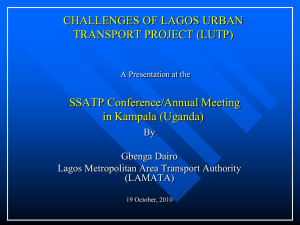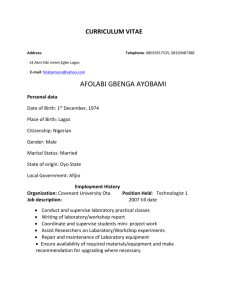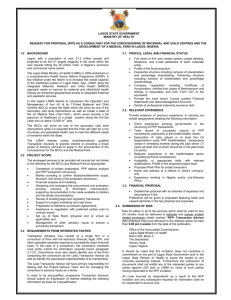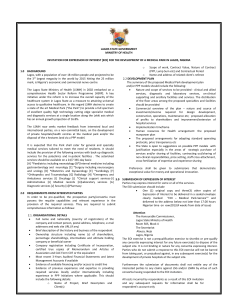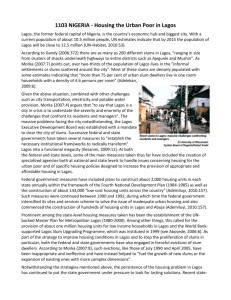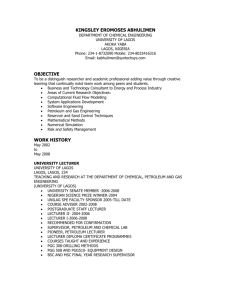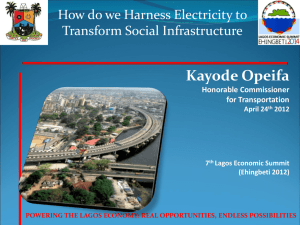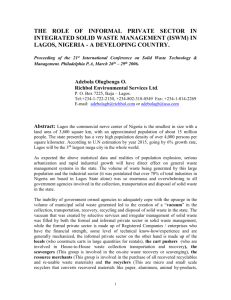population growth and waste management in an
advertisement
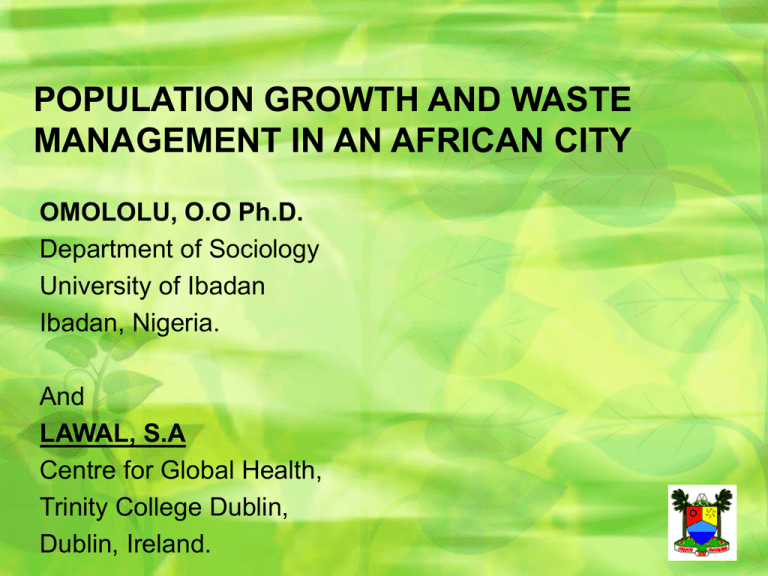
POPULATION GROWTH AND WASTE MANAGEMENT IN AN AFRICAN CITY OMOLOLU, O.O Ph.D. Department of Sociology University of Ibadan Ibadan, Nigeria. And LAWAL, S.A Centre for Global Health, Trinity College Dublin, Dublin, Ireland. Introduction • In mid 2010, data shows that 1,030 million people reside in the continent of Africa (PRB, 2010). • While 158 million of the continents inhabitants are found in Nigeria. • 47% now live in urban spaces thereby increasing the competition for resources on a daily basis leading to: • Inadequate infrastructures and amenities • Inadequate housing for all • Increase in slums dwellers • High crime rates • Traffic congestion and • High volume of waste generated daily. Introduction (2) Population in Lagos is put at 9, 113, 605 million (NPC, 2006). Highest concentration of industries in the West African sub-region (Uroko, 2008). Waste management in Lagos gulps between 2025% of government funds on the average and; Only two trips of waste is made before the end of the day, but close to 40 trips can be made in other cities (Owoh 2006). This study is significant because it provides insights into environmental health and make recommendations for policy improvement. The Challenges of waste in Lagos According to Kofoworola (2007) problems of waste management in Lagos includes the following: • Improper collection system, • lack of adequate waste collection equipment and vehicles, • indiscriminate dumping of waste, • lack of continuity and implementation of government policies, and • the current waste management practice in Lagos Implications of waste on health • These includes an increase in health outcomes such as: • • • • • • • • • Headaches Sleepiness Respiratory symptoms Psychological conditions Gastrointestinal complaints Cancers Adverse pregnancy outcomes Abnormalities in liver function and Renal diseases (Vrijheid, 2000). “The rate of hospitalisation for diabetes has increased in populations close to hazardous waste site” (Kouznetsova, Huang, Ma, Lessner, and Carpenter, 2007). Objectives The overall objective of the study was to examine the influence of population growth on waste management in Lagos metropolis. Specific objectives: • To explain the effect of population growth on waste generation in Lagos metropolis. • To examine the pattern of waste collection, transportation and disposal in Lagos. • To ascertain the effectiveness of public-private partnerships (PPP) towards waste management in Lagos. Definition of Waste Waste (also known as rubbish, trash, refuse, garbage, or junk) is unwanted or unusable materials, which has been disposed off (wikipedia online). Classification of waste • • • • • • • • • • • • • (i) Domestic/Residential Waste (ii) Commercial Waste (iii) Institutional Waste (iv) Garbage (v) Rubbish (vi) Ashes (vi) Bulky Wastes (viii) Dead Animals (ix) Construction and Demolition Wastes (x) Industrial Wastes (xi) Hazardous Wastes (xii) Sewage Wastes (xiii) Medical wastes Waste Collection and transportation • Various waste collection methods has been adopted in Lagos metropolis. These include: • • • • • • • • • • House to house Communal depots Kerbsides Block systems of collection Commercial and industrial waste collection Bulk loading Cart Open bed trucks Trucks Compactors Methodology • Secondary data (Lagos State Waste Management Authority (LAWMA)-domestic waste unit; • Primary data (questionnaires and in-depth interview-IDI); • A multi-stage sampling approach was adopted; • The clustering of the study area into council wards; • A random selection of households and industries; • A purposive selection of educational institutions and 10 IDI was done; • A total of 290 respondents were administered the questionnaires; • The data were analysed in form of simple percentages; • The (IDI) was interpreted to match the objectives of the study; • The secondary data collected was interpreted to explain the causal relationship between population growth and waste management in Lagos metropolis. Findings • The study showed that majority of the respondents were single 181(62.4%), while 109(37.6%) were married. • The secondary data showed that as the population increased, the amount of waste generated also increased as per capita waste generation per person is put at 0.5kg/p/day. • • • • • Alimosho LGA Year Population 2006 1, 362, 077 2007 1, 432,164 2008 1, 546, 737 • “The continuous increase in population as experienced in Lagos brings about increase in waste generated daily...” Female (Corporate Intelligence Unit) Waste generated 248,579.60 tones 261, 369.20 tones 282, 280.05 tones • (87.8%) population growth has an effect on waste management (12.2%) of them think otherwise. Therefore “population growth has a causal relationship with waste management in urban centres”... (Zerbock, 2003) Waste collection, transportation and disposal • Waste collection- • • • • • Once a week (46.3%) Twice a week (21.1%) Not collected (12.6%) and result to burning at night Once in two weeks (11.6%) Once a month (8.4%) • Waste transportation and disposal Study Findings • (61.1%) engage the services of cart pushers (kọlẻ kọlẻ) • (38.9%) do not • (58.9%) engage the services of private operators • (38.9%) do not and • (2.1%) sometimes engage their services and sometimes do not engage their services. PPP and waste management in Lagos • (47.0%) LAWMA have been effective in the management of waste (12.2%) LAWMA have been ineffective and • (40.8%) were undecided. • “LAWMA operates during the day and at night, it does street sweeping and refuse evacuation across the metropolis”... Male (Domestic waste Unit). • (56.1%) private operators are effective in the management of waste (22.4%) private operators have been ineffective and (21.5%) were undecided. • A shared IDI response revealed that: “Their performance is satisfactory because the private operators are very effective, though some perform averagely; their participation is still required as LAWMA directs some of the Private Sector Participation (PSP) activities”. Conclusion and Recommendations The study showed that waste generation in Lagos state from 2006-2008 increased as population growth was found to have a significant influence on waste management in Lagos metropolis. • Therefore; • The need for increased waste education and awareness programmes on radio and television stations daily • The need to introduce waste management practices into the school curriculum • Establishment of recycling plants across each L.G.A of the state • The need for mobile phone alerts as a medium of advocacy • The fee for payment on waste collection should be made affordable • Public private partnerships should be widely encouraged in the collection, transportation and disposal of waste in Lagos state, Nigeria. THANK YOU THANK YOU (Lagos will not get spoilt).
